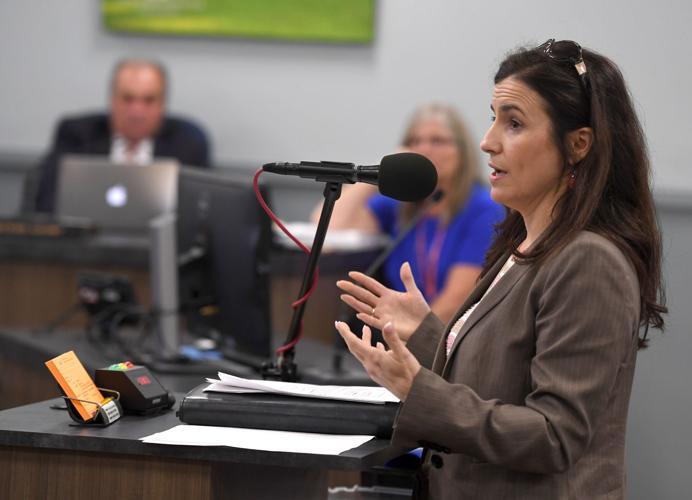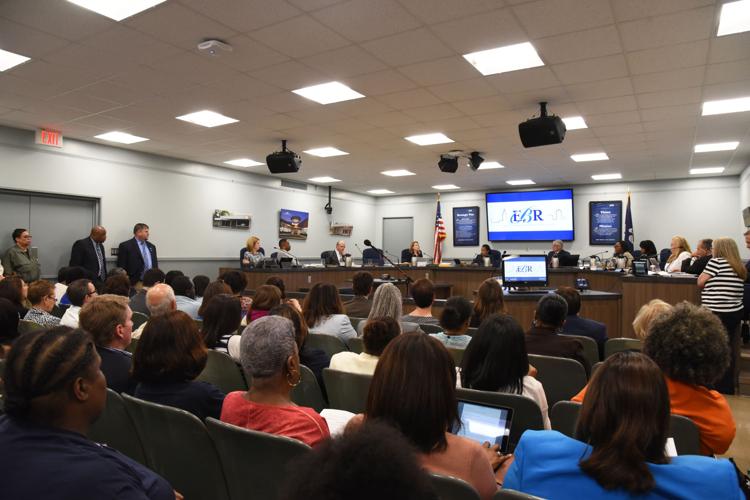The East Baton Rouge Parish School Board voted unanimously Thursday to grant a multi-million-dollar property tax break to ExxonMobil on a potential Baton Rouge plant expansion after an LSU economist hired by the board called it a “good investment for local governments in East Baton Rouge.”
With the School Board's unanimous 9-0 vote, ExxonMobil now takes its case to the Metro Council, which plans to take up the issue on Wednesday and again on Oct. 10. Sheriff Sid Gautreaux has yet to act. The local taxing authorities have up to 60 days — until late October — to act. If they do nothing, the exemption is approved as is.
ExxonMobil on Wednesday won approval for a multimillion-dollar property tax break on a potential Baton Rouge plant expansion the company said …
The polyolefins plant expansion, on which ExxonMobil says it plans to spend from $500 million to $1 billion to bring online, is the energy giant’s first tax break request under new state rules for the decades-old Industrial Tax Exemption Program.
Angela Zeringue, a plant manager with ExxonMobil, called the proposed project “a true win, not just for Baton Rouge and Louisiana” and said the ITEP exemption is an important part of whether it comes here or not.
“This program allows us to compete for projects that could go not just here but anywhere around the world,” Zeringue said.
Several current and former Exxon employees, as well as other supporters of the company, also spoke in favor of the exemption request as key to landing this prized project.
Together Baton Rouge, a faith-based group, on Thursday continued its critiques of ITEP and other issues involving ExxonMobil, but did not criticize the polyolefins proposal.
“Together Baton Rouge has no objections to this proposal,” said lead organizer Broderick Bagert, “but we’re not going to endorse it because protections have not been put in place.”
In particular, the organization pressed the board to establish local guidelines for all future tax break requests, including four more projects that ExxonMobil is also seeking exemptions for.
“We are now giving large, significant exemptions, multi-million dollar exemptions, without setting up standards,” Bagert said.
Several educators buttressed that point, arguing they have to follow a wide variety of standards in their jobs and so companies seeking tax breaks should have to meet standards too.
“The idea that this board would give out exemptions without standards when we are in a deficit situation is ludicrous,” said Laverne Simoneaux, who teaches English-as-a-second-language at Woodlawn Elementary.
Unlike some previous exemption requests from Exxon, this project has yet to be built and would be a major expansion creating more than 25 full-time jobs. Those are all criteria that Together Baton Rouge has said previously should be applied to all ITEP requests.
Two board members sympathetic to Together Baton Rouge and teacher unions ended up supporting the proposal, though they indicated they won’t necessarily agree to every ITEP exemption.
“I will let you have this one, but the next ones coming I don’t know,” board member Vereta Lee said.
Under the new state rules, approved projects receive an 80 percent property tax abatement — down from 100 percent previously — over 10 years, instead of eight.
But, in a big change from the past, local taxing authorities now get a chance to say “yea” or “nay” to the portion of the tax breaks that applies to them. In East Baton Rouge Parish, that includes the School Board as well as the Metro Council and the sheriff.
ExxonMobil has plans to start construction on the plant expansion in early 2019 and complete work by 2021. The 10-year tax abatement would start in 2021 and end in 2031.
Exxon’s exemption request to expand its polyolefins complex on Scenic Highway in north Baton Rouge was approved on Aug. 29 by the Louisiana Board of Commerce and Industry. Gov. John Bel Edwards, Mayor-President Sharon Weston Broome and the Baton Rouge Area Chamber have all endorsed Exxon’s tax break request.
ITEP is designed to give manufacturers a break on their property taxes on new capital expenditures.
The LSU College of Business analyzed the project for the Louisiana Department of Economic Development. The college estimates that, if granted, ExxonMobil would be exempt from paying $31.7 million parishwide over the 10-year life of the exemption, almost $15 million of that would otherwise go to schools. During that same time span, according to the analysis, ExxonMobil would pay still pay almost $8 million in property taxes, plus another $15.2 million in the 10 years after the exemption expires. On top of that, the project is expected to generate another $32 million in sales taxes over that time.
The company said the project would create 45 new direct jobs, 20 permanent contractor jobs and 600 construction jobs at peak development.
“I want to stress that those are conservative estimates and this could be potentially higher than that,” Zeringue told the board.
The expansion, though, is not a certainty. If this ITEP exemption is rejected, the company has indicated it might not go forward with the project, or it might build it instead at one of its Texas locations.
In a report released earlier this week, LSU economics professor Jim Richardson calculated “benefit-cost” ratios for the project, examining two time periods: 2019 to 2031 and 2019 to 2041. In both cases, sales and property taxes generated would be more than what would be lost to the exemption, Richardson found.
Richard said that any benefit-cost ratio greater than 1 represents a positive return on the investment.
The 2019 to 2031 benefit-cost ratio is only slightly above 1, though — 1.18 for just the School Board and 1.25 for the entire parish. The ratio improves notably to 1.79 and 1.87, respectively, during the longer 2019 to 2041 window that captures tax revenue generated for 10 years after the exemption would expire. The strongest sales and property tax revenue is being generated during construction.
All things considered, Richardson called it a good deal.
“That is the story from my perspective,” Richardson said.








